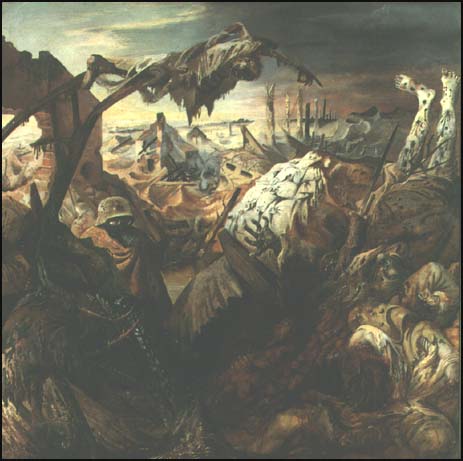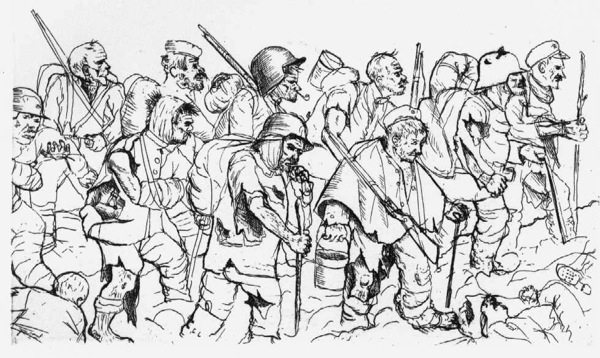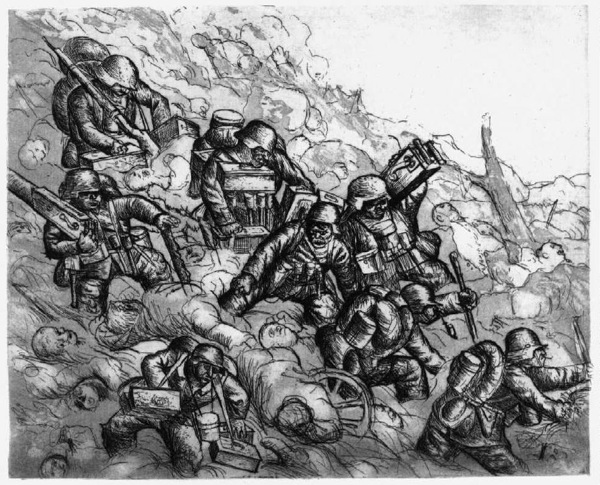A Farewell to Armistice Day: “What Hellish Seed…?”
Tuesday, November 11, 2008
posted by Steve Tompkins
 Print This Post
Print This Post
It’s been ninety years since “the eleventh hour of the eleventh day of the eleventh month” of 1918 on the Western Front, and very soon now recalled or recollected history will give way entirely to history that is merely recorded. My thoughts never require much encouragement to run to World War One, and this morning two “holiday”-themed pieces got me musing about remembrance and the conflict that murdered illusions and mothered ironies, the distant Armageddon of Robert E. Howard’s childhood. In “Photographer Races Clock to Honor Last Few World War I Vets” Mark Bixier and Paula Hancocks describe the commemorative efforts of one David De Jonge, who’s driven by his awareness of “the last breaths of the last souls who witnessed one of the most horrific wars this world has ever seen.” By his painstakingly researched count, only ten veterans — of any Great War army — still survive:
Four live in Britain, two in Australia, two in France and two in the United States: Buckles and 108-year-old John Babcock of Spokane, Washington, who served with Canadian forces during World War I, DeJonge said.
Each week or month that passes, it seems, brings news of an aging veteran succumbing before DeJonge can find the time and money to photograph him.
Not long ago, he said, two Jamaicans who fought with the British during World War I died. The last known German, French and Austro-Hungarian veterans died in the last year as well.
“These are the last of the last,” he said.
The second article is Alexander Watson’s NYT Op-Ed contribution “A Holiday to End All Wars,” a succinct meditation on how “not all ‘victors’ experience war in the same way”; citizens of triumphant nations “can have almost as much difficulty as those of the vanquished states in coping with the collective trauma of conflict.” Here’s an excerpt:
Today, the commemoration of Nov. 11 varies greatly across Europe. For Poles, the holiday is not a day of mourning but rather of celebration, commemorating the rebirth of their nation in 1918 after more than a century of occupation by Austria-Hungary, Prussia and Russia. In Italy, the war dead are remembered on Nov. 4, “the feast of the fallen,” the day in 1918 that fighting came to an end on its battlefront. Across Central Europe though, the greater horrors of the Second World War have subsumed those of its predecessor within popular memory; in Germany, for example, commemoration of the Holocaust and other Nazi atrocities now takes precedence over the losses of the last century’s first conflagration.
Yet in France, where the death toll of 1914 to 1918 exceeded that of 1939 to 1945, the dead of World War I retain a strong grip on the national conscience. Across the country today, local mayors will lead remembrance services, the names of long-buried soldiers will be read out, military bands will play and citizens will sing “La Marseillaise.”
In Britain, where an estimated three-quarters of the population paused during the two-minute silence on the armistice’s 80th anniversary and where, in 2002, a BBC poll rated the Unknown Warrior as the country’s 76th greatest citizen, public memory of the war is even stronger. Visit the country (or its former dominions including Canada and New Zealand) in November and you will still see paper poppies being widely worn — a reference to the blood-red flowers which grew on the shell-torn battlefields and to John McCrae’s poem “In Flanders Fields.”
Here in the U.S. a well-meaning Kansas shoe store owner began pushing to broaden Armistice Day from its original historical context into a more general Veterans Day in 1953; fittingly, the resulting bill reached the desk of one of the most high-profile American participants in World War Two and was signed by Dwight Eisenhower in May of 1954. As often seems to be the case, a gain in inclusiveness entailed a loss in event-specificity, and 1918 was relegated to being just another one of the many years this country was at war.
Yes, certainly all veterans deserve to be honored, but having had the privilege of being in London on two different Remembrance Days, I regret the comparative vagueness or referential thinning-out of our holiday. Eye-and-ear-witnessing the two-minute silence observed in the U.K. is a remarkable experience; everything seems to stop as now defers to then and the present is willingly usurped by the past; it’s almost like the real Samhain as the barriers between the living and the dead are flattened and trampled by the latter.
Our starring role in the Second World War rendered what was essentially a glorified walk-on in the First sepia-toned and superannuated. But although the earlier belligerency was relatively brief, it was far from relatively bloodless. I’ve seen totals of 53,513 and 53,402 KIA for the U. S. — compare those to 47,424 or 47,369 for Vietnam, a much, much lengthier war for us (to say nothing of the Vietnamese), and it’s clear that the meat-grinder wasn’t exactly slowed by tactical innovations or relative high-spiritedness on the part of the American Expeditionary Force.
The received wisdom about the time we spent Over There, that we were played for suckers by British propaganda and Messianic Wilsonian rhetoric, that puppetmasters and profiteers like the “merchants of death” were behind it all, contributed to more than just the isolationism that it took December 7, 1941 to overcome. The wised-up, clued-in determination not to be the patsy or the easy mark again helped to shape the hardboiled and noir mentalities; Rick in Casablanca may have run guns to the Ethiopians resisting Mussolini’s invasion, and fought against the Fascists in Spain, but when he snarls “I stick my neck out for nobody,” we can hear 1917-1918 in his words. Belatedly reverting to this site’s primary concerns, the Great War cost us Saki (Hector Hugo Munro) due to a sniper’s bullet in November of 1916, and William Hope Hodgson due to shellfire in April of 1918, but in a very real sense gave us J. R. R. Tolkien. And, I submit, helped to give us Robert E. Howard.
I’ve argued elsewhere that the difference that runs like a system of trenches between Edgar Rice Burroughs and REH is the First World War. Howard’s account of how he and his friends chose up sides, some backing the Central Powers, others the Allies, can be found in The Last Celt, while Steve Eng’s “Barbarian Bard” in The Dark Barbarian evaluates his Flanders-based war poetry. He loaned Francis Xavier Gordon to T. E. Lawrence and the Arab Revolt as a sort of eighth pillar of (hard-won) wisdom in “Son of the White Wolf,” but chose to de-romanticize this most romantic of Great War theaters with the butchered infant El Borak comes across after the Turkish mutineers massacre an village. An initial draft of “Isle of the Eons” begins, like Burroughs’ The Land that Time Forgot and Lovecraft’s “Dagon,” with a run-in with seagoing Huns. And “Skull Face,” too knee-jerkily dismissed as a Sax Rohmer pastiche, was published in 1929, the same year as A Farewell to Arms and three years after The Sun Also Rises did so much to popularize — and glamorize — the notion of a Lost Generation. Howard’s Costigan (“I had crossed an ocean over which I never could return”) is at least as wounded as Hem’s Jake Barnes:
You ask how I, Stephen Costigan, American and a man of some
attainments and culture, came to lie in a filthy dive of London’s
Limehouse? The answer is simple–no jaded debauchee, I, seeking new
sensations in the mysteries of the Orient. I answer–Argonne! Heavens,
what deeps and heights of horror lurk in that one word alone! Shell-
shocked–shell-torn. Endless days and nights without end and roaring
red hell over No Man’s Land where I lay shot and bayoneted to shreds
of gory flesh. My body recovered, how I know not; my mind never did.And the leaping fires and shifting shadows in my tortured brain
drove me down and down, along the stairs of degradation, uncaring
until at last I found surcease in Yun Shatu’s Temple of Dreams, where
I slew my red dreams in other dreams–the dreams of hashish whereby a
man may descend to the lower pits of the reddest hells or soar into
those unnamable heights where the stars are diamond pinpoints beneath
his feet.
It would be interesting to learn how many pulpsmiths were working what would have been considered the rather unheroic concept of shell-shock into their stories in 1929.
The reek and ruckus of the war are even detectable in the sword-and-sorcery. With the kind indulgence of Messrs. Burke and Louinet I sought to make a case in the intro for Kull: Exile of Atlantis that the Atlantean is unmistakably a “postwar” character, and “Black Colossus” also repays study in this respect.
Recall what we’re told of Natohk’s warmaking: “At his bidding the demons of the air brought thunder and wind and fog, the fiends of the underworld shook the earth with awful roaring. He brought fire out of the air and consumed the gates of walled cities, and burnt armored men to bits of charred bone.” Against these “advances” there stands, or at least postures, the “affected” Count Thespides, he of the pointed mustache and pointed shoes, proud possessor of a “velvet chaperon with a scarlet feather fastened by a golden clasp.” Already peeved by Yasmela’s Mitra-urged promotion of Conan — “it is an insult to ask gentlemen to serve under him!” — Thespides cannot brook the Cimmerian’s caution after a literalization of the fog of war. He and his knights, each sporting “a lady’s token, a glove, scarf or rose, bound to his helmet or fastened to his swordbelt,” will win the battle chivalrously, as so many Uhlans and cuirassiers, hussars and spahis still cherished hopes of winning in 1914:
The horde had halted. From the extreme wing rushed a chariot, the naked charioteer lashing the steeds like a madman; the other occupant was a tall figure whose robe floated spectrally on the wind. He held in his arms a great vessel of gold and from it poured a thin stream that sparkled in the sunlight. Across the whole front of the desert horde the chariot swept, and behind its thundering wheels was left, like the wake behind a ship, a long thin powdery line that glittered in the sands like the phosphorescent track of a serpent.
“That’s Natohk!” swore Amalric. “What hellish seed is he sowing?”
The charging knights had not checked their headlong pace. Another fifty paces and they would crash into the uneven Kushite ranks, which stood motionless, spears lifted. Now the foremost knights had reached the thin line that glittered across the sands. They did not heed that crawling menace. But as the steel-shod hoofs of the horses struck it, it was as when steel strikes flint–but with more terrible result. A terrific explosion rocked the desert, which seemed to split apart along the strewn line with an awful burst of white flame.
In that instant the whole foremost line of the knights was seen enveloped in that flame, horses and steel-clad riders withering in the glare like insects in an open blaze. The next instant the rear ranks were piling up on their charred bodies. Unable to check their headlong velocity, rank after rank crashed into the ruins. With appalling suddenness the charge had turned into a shambles where armored figures died amid screaming, mangled horses.
Now the illusion of confusion vanished as the horde settled into orderly lines. The wild Kushites rushed into the shambles, spearing the wounded, bursting the helmets of the knights with stones and iron hammers. It was all over so quickly that the watchers on the slopes stood dazed; and again the horde moved forward, splitting to avoid the charred waste of corpses. From the hills went up a cry: “We fight not men but devils!”
Or not devils but the diabolism of modern warfare. With this single scene Howard makes himself the successor to the machine gun-manning Mark Twain of A Connecticut Yankee in King Arthur’s Court. The war he read about in newspapers, like the Indian wars he heard about, never really left him.
Allow me to wrap this up with two of the most moving accounts of what Armistice Day used to be about. The first is by a man who never really recovered not from the war but from having just missed his chance to fight in the war; Dick Diver and friends are touring French battlefields in Tender Is the Night:
“See that little stream — we could walk to it in two minutes. It took the British a month to walk to it — a whole empire walking very slowly, dying in front and pushing forward behind. And another empire walked very slowly backward a few inches a day, leaving the dead like a million bloody rugs. No Europeans will ever do that again in this generation.”
“Why, they’ve only just quit over in Turkey,” said Abe. “And in Morocco — ”
“That’s different. This western-front business couldn’t be done again, not for a long time. The young men think they could do it but they couldn’t. They could fight the first Marne again but not this. This took religion and years of plenty and tremendous sureties and the exact relation that existed between the classes. The Russians and Italians weren’t any good on this front. You had to have a whole-souled sentimental equipment going back further than you could remember. You had to remember Christmas, and postcards of the Crown Prince and his fiancée, and little cafés in Valence and beer gardens in Unter den Linden and weddings at the Mairie, and going to the Derby, and your grandfather’s whiskers.”
“General Grant invented this kind of battle at Petersburg in sixty-five.”
“No, he didn’t — he just invented mass butchery. This kind of battle was invented by Lewis Carroll and Jules Verne and whoever wrote Undine, and country deacons bowling and marraines in Marseilles and girls seduced in the back lanes of Wurtemburg and Westphalia. Why, this was a love battle — there was a century of middle-class love spent here. This was the last love battle.”
The second is from English poet Philip Larkin, who’s turned up here before (in a bad-mouthing Beowulf context):
MCMXIV
Those long uneven lines
Standing as patiently
As if they were stretched outside
The Oval or Villa Park,
The crowns of hats, the sun
On moustached archaic faces
Grinning as if it were all
An August Bank Holiday lark;
And the shut shops, the bleached
Established names on the sunblinds,
The farthings and sovereigns,
And dark-clothed children at play
Called after kings and queens,
The tin advertisements
For cocoa and twist, and the pubs
Wide open all day–
And the countryside not caring:
The place names all hazed over
With flowering grasses, and fields
Shadowing Domesday lines
Under wheat’s restless silence;
The differently-dressed servants
With tiny rooms in huge houses,
The dust behind limousines;
Never such innocence,
Never before or since,
As changed itself to past
Without a word–the men
Leaving the gardens tidy,
The thousands of marriages,
Lasting a little while longer:
Never such innocence again.
If that reverie, of the piercingly poignant mobilizations after the diplomats and politicians so signally failed to justify their existence in 1914, still fails to come into focus, I recommend reading a little about the mood of the various citizenries in September of 1939 as opposed to the exuberant “moustached archaic faces” of August 1914. It’s a hard world, made all the harder by the knowledge that the last of those who knew Larkin’s never-to-be-repeated innocence, who withstood Fitzgerald’s “last love battle,” are gone or going.
Postscript: The prevalence of coal scuttle helmets in the illustrations this time is not evidence of Kaisersheer sympathies but rather reverence for the work of that great Goya-successor Otto Dix, veteran of the Western and Eastern Fronts, Iron Cross winner, subsequent scourge of Weimar rightists, and exhibitee in the Third Reich’s “degenerate art” proscriptions.








